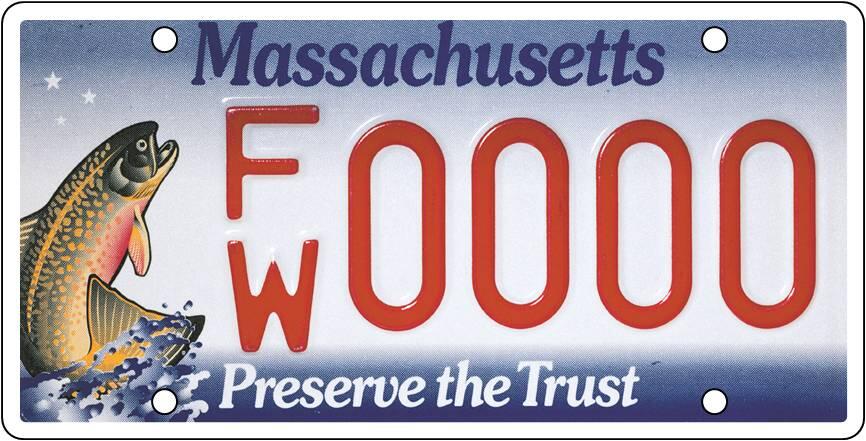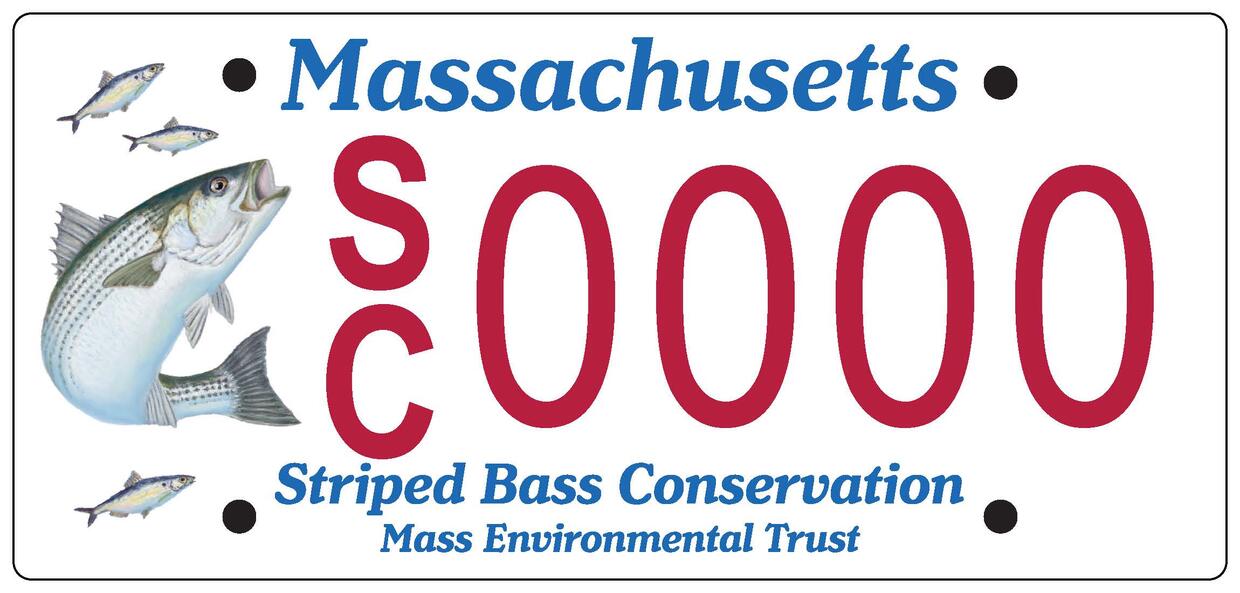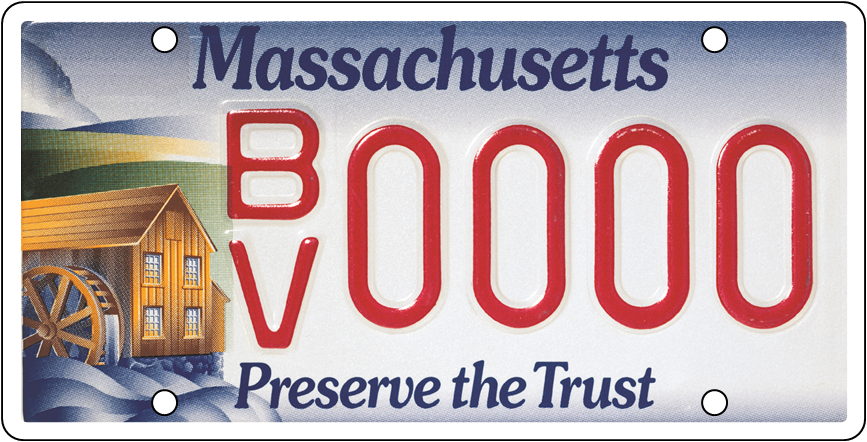Overview
Funding Impact: Funded by proceeds from environmentally themed license plates and donations, MET grants support:
- Endangered species protection (including the critically endangered North Atlantic right whale)
- Whale disentanglement and conservation research
- Development of safer fishing gear technologies
- Marine and freshwater habitat restoration
- Grassroots conservation and citizen engagement (e.g., cleanups, volunteer habitat restoration)
- Early-stage planning and design for wetland and coastal restoration
- Public education, signage, workshops, and conferences on aquatic ecosystems and endangered species
Join over 30,000 Massachusetts drivers already making a difference with one of the four Environmental License Plates! Be part of the solution—support conservation, protect our natural resources, and inspire others to do the same. Get yours today and make every trip count!

How much does a plate cost?
Initial Cost
| RMV registration fee: | $60 |
|---|---|
| The special plate fee is: | $40 (tax-deductible contribution) |
| Total first time fee: | $100 |
| Renewal fee every 2 years | $100 |
| Plate swap fee: | $20 |
About the Plates
Right Whale & Roseate Terns Plate
Offered since 1994, this popular plate features the fluke of a right whale and two roseate terns. The North Atlantic right whale is the state marine mammal and the world’s most endangered large whale. Roseate terns are native to Massachusetts and are also endangered. Both of these animals are federally recognized endangered species and are dependent upon healthy Massachusetts ecosystems for their survival.
Whale Plate Impact: Proceeds from WHALE plate sales and renewals directly support marine conservation and the experts who protect endangered marine animals—especially the critically endangered North Atlantic right whale.
Each year, the Massachusetts Environmental Trust allocates $200,000 in WHALE plate funds to the Atlantic Large Whale and Sea Turtle Disentanglement Network (ALWDN). This essential program brings together the Division of Marine Fisheries (DMF), the Center for Coastal Studies, and the National Oceanic and Atmospheric Administration (NOAA) to rescue entangled whales and sea turtles, promote safer fishing practices, and meet state and federal mandates for protecting endangered species.
By choosing the WHALE plate, you play a direct role in safeguarding marine wildlife and keeping Massachusetts waters healthy for generations to come.
Leaping Brook Trout Plate
Introduced in 1998, the brook trout represents Massachusetts cold waterways. The brook trout is native to the state’s western streams and this popular game fish serves as a symbol of both the pristine water in which it thrives, and the recreational benefits of a healthy environment.
Trout Plate Impact: The Massachusetts Environmental Trust (MET) partners with MassWildlife to use proceeds from the Brook Trout license plate to restore and protect vital habitats for wild trout and other coldwater species. A portion of the funds from the TROUT plate directly supports ongoing efforts by MassWildlife to manage and restore streams and rivers across the Commonwealth.
Healthy coldwater ecosystems provide more than just habitat—they offer premier recreational opportunities such as fishing, kayaking, and outdoor exploration. These pristine waters are essential for native trout and other species but face increasing threats from climate change, rising temperatures, and habitat loss.
By choosing the TROUT plate, you’re helping to strengthen conservation partnerships, ensuring Massachusetts’ coldwater habitats remain healthy and resilient. Support clean, thriving waters and the outdoor recreation they enable—because a healthy environment benefits everyone.
Striped Bass Conservation License Plate
The MA Environmental Trust (MET) and the Division of Marine Fisheries (DMF) developed this plate to support new programs to research, protect, and preserve striped bass populations, ensuring that future generations of anglers have the opportunity to experience the unmatched thrill of fishing for this iconic species.
Blackstone Valley Mill Plate
The Blackstone Valley, running through the central part of the state, was the birthplace of the American Industrial Revolution. Offered since 1999, the BV plate reminds us that our environmental focus must include more than whales and habitat protection. This plate highlights the need to restore our urban rivers and streams to enhance their ecology and improve the health of riverfront communities.

Who can get an MET Environmental License Plate?
Eligibility: Anyone with an active, good-standing passenger vehicle (PAS) registration in Massachusetts.
Leased Vehicles: Yes, you can put a specialty plate on a leased vehicle! You will need two things:
- A Power of Attorney letter from your leasing agent.
- An RTA - Registration and Title form signed by your car insurance provider.
Vehicles Not Eligible: As of now, you cannot put a specialty plate on a commercial or recreational vehicle.
How to Get a Plate
Buy Your Plate Online – No visit to the RMV!
- Order your specialty plate online through the MASS RMV. There are no shipping fees when ordering online
- Choose ORDER A SPECIAL/VANITY PLATE
- Fill out the required form on the RMV site
- Select the vehicle you want the plate for and press next
- From the Vehicle Registration Plate Order page scroll down to the next button
- Choose Charitable Plate from the dropdown menu
- Choose Blackstone Valley, Fish & Wildlife, Right Whale or Striped Bass plate from the dropdown menu
- Go through the motions and pay. Your new plates, registration, and decal will be mailed to you within 10 business days
Order from an RMV Service Center
You must bring a completed Registration and Title Application Form (RTA) stamped by your car insurance provider. To obtain this form, call your car insurance provider and ask them complete the RTA form for a plate swap. Bring this form with you to the RMV. As long as your current registration is in good standing (no outstanding excise taxes, fines, tickets, etc.) you will be able to take your new license plate home.
Order from a Dealership
Many car dealers can issue the plates right from their location, if the dealership doesn't have the plate you want in stock, they may issue a temporary license plate, and your specialty plate will be mailed directly to you from the RMV. For a fee the dealership can send a representative to the RMV to get your plate of choice. Be Specific: Make sure to specifically ask for a whale, trout, striped bass, or Blackstone valley plate.
Experiencing difficulties swapping out your current plate for one of our 4 charitable plates. Call MET at 617-626-1010 or email met@mass.gov or you can contact the Specialty Plate Department by calling 857-368-8031. We are here to help!
Frequently Asked Questions (FAQs)
Cost and Payment
What is the initial cost of a met specialty plate?
- A Massachusetts Environmental Trust specialty license plate costs $40, in addition to the $60 RMV registration fee.
Does the plate fee cover my regular vehicle registration?
- No, you must renew your vehicle registration separately every two years at the standard fee of $100 (which includes the $60 RMV renewal fee). Your registration fee will be prorated depending on where you are in your registration cycle, and if applicable, a one-time RMV swap fee of $20 to process the conversion. Any fees, including the swap fee is payable when you pick up your plate at an RMV Service Center. In most cases, the RMV will send an e-payment link to the email address on file.
How often do i pay the $40 specialty plate fee?
- The $40 fee is paid every two years when you renew your registration, making the total renewal cost $100 every two years.
Is the specialty plate fee tax-deductible?
- Yes. $28 is tax-deductible with your first-time order ($12 goes to the RMV for production costs). The entire $40 fee is deductible upon every two-year renewal.
Application and Ownership
Do I need a separate application for each vehicle?
- Yes, MassDOT requires a separate application and payment for each specialty plate.
Do I need to be a MA resident to buy an MET plate?
- No, anyone with a vehicle registered in Massachusetts may purchase an MET Specialty Plate.
Can I use met plates on a leased vehicle?
- Yes. You will need a Power of Attorney letter from your leasing agent in addition to a Registration and Title Application Form signed by your car insurance provider. Generally, car dealerships will not have specialty plates available, but if you ask specifically for an MET plate, they should be able to provide a temporary plate while your MET is being processed or you will need to accept whatever plate the dealer puts on the vehicle and then make the swap at your local RMV.
If I am not in Massachusetts to swap my plate when it’s ready, can I have someone do it on my behalf?
- Yes, as long none of the information on the originally submitted application has changed.
Are all vehicles eligible?
- Specialty plates are for passenger vehicles only.
- Commercial vehicles and motorcycles are not eligible for specialty plates, however, there is legislation being proposed that would allow for specialty plates.
Handling old plates
- You can surrender your old plates at the RMV when you get your new ones, or you can destroy them (cut them in half).
Gifting an MET Plate
Whose information do I use if I'm buying the plate as a gift?
- Enter the information associated with the car's registration (the recipient's information). If gifting to a spouse/child on the same insurance, you can complete this yourself in advance as long as you have their information.
Custom Requests
Can I personalize this new specialty plate?
- No, like all Massachusetts specialty license plates, the plates begin with two letters (RW/RT, FW, SC, BV) followed by up to four digits.
Can I reserve a custom license plate number?
- Normally, specialty plates are randomly assigned, however, if you have a certain RW/RT, FW, SC, BV sequence you want you may call the Special Plates Department at (857) 368-8031 and ask if it is available, but you cannot retain your current plate number. If the plate is available, the RMV will inform you of the next steps in getting the plate you want.
Does MET have low number plates?
- Our initial Whale Tail, Trout, and Blackstone Valley plates all have plates 1-999 and the Striped Bass plate has a selection of low numbers from 9-99, all are held in reserve for auctions.
I think I applied for MET’s newest Striped Bass plate when it came out in 2019 but I am not sure. How can I check?
- Please contact met@mass.gov or call 617-626-1010.



